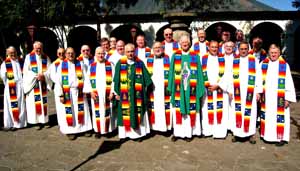By Celine Klosterman

Two priests of the Davenport Diocese said their faith was reinforced by a pilgrimage highlighting the sacrifices Catholic martyrs made during Central American conflicts in the 1980s.
Fathers David Hitch and Dennis Martin joined about 20 priests and deacons in Guatemala and El Salvador from Jan. 16-27 on an annual trip organized by the Maryknoll Fathers & Brothers. They visited sites where six Jesuit priests, four U.S. churchwomen, Archbishop Oscar Romero and other advocates for the poor were killed during civil wars.
Fr. Hitch said he was inspired to make the journey after traveling to Rome last year and walking in the footsteps of early Christians who died for their faith. “Now, I saw an opportunity to follow in the steps of contemporary martyrs,” said the pastor of St. Mary parishes in Tipton and Mechanicsville.
He invited Fr. Martin, pastor of St. Joseph Parish in West Liberty and St. Bernadette Parish in West Branch, to join him.
Maryknoll missionaries who served in Central America during the 1980s and ‘90s led the pilgrims in prayer and reflection at the sites of killings, Fr. Hitch said. Witnesses to some of the atrocities shared recollections. One man recalled escaping bullets as a child after Guatemalan troops opened fire on a crowd protesting the 1981 murder of a beloved priest, Father Stanley Rother of Oklahoma. “Priests were being killed because they were teaching religion, building hospitals and orphanages, and speaking out for the poor and against the government,” Fr. Hitch said.
Numerous catechists and lay faith leaders were killed, too, Fr. Martin noted.
More than 75,000 people died during civil war in El Salvador from 1980-1992. El Salvadoran armed forces massacred peasants, according to the report of the U.N. Truth Commission on El Salvador.
About 200,000 people died during 36 years of armed Guatemalan conflict that ended in 1996, according to the country’s truth and reconciliation commission. The commission said the Guatemalan military had committed “acts of genocide” against indigenous people.
“They wiped out whole villages,” Fr. Martin said. “And lots of the military’s supplies and training were provided by our government.”
The places where innocents died are holy ground, he said. “My spirituality was reinforced by reviewing the sacrifices that martyrs made.”
Fr. Hitch was struck by the sacrifices of his fellow priests. “Their faith meant so much to them that they were brutalized by death squads,” he said.
Impoverished Central Americans also left an impression on the Iowa priests. “I’ve never seen poverty like that before,” Fr. Hitch said. “One kid was drinking from a dirty creek where people were washing their clothes.”
More than half of Guatemala’s population and 38 percent of El Salvador’s population live below the poverty line, according to the Central Intelligence Agency’s World Factbook.
But Fr. Martin saw spiritual riches. “Hundreds of people packed the church when we concelebrated Mass in Santiago Atitlan, Guatemala. They walked for miles from every direction to get there. Seeing people with such great faith and so few worldly possessions helped strengthen my faith,” said the priest, who ministers to El Salvadoran and Guatemalan immigrants at St. Joseph Parish.
Fr. Hitch is trying to spread knowledge of recent Central American history through presentations to parishioners and other means. He said Maryknoll missionaries told pilgrims: “You’ve seen and heard about this, and you’re implicated. Now you have to respond.”







